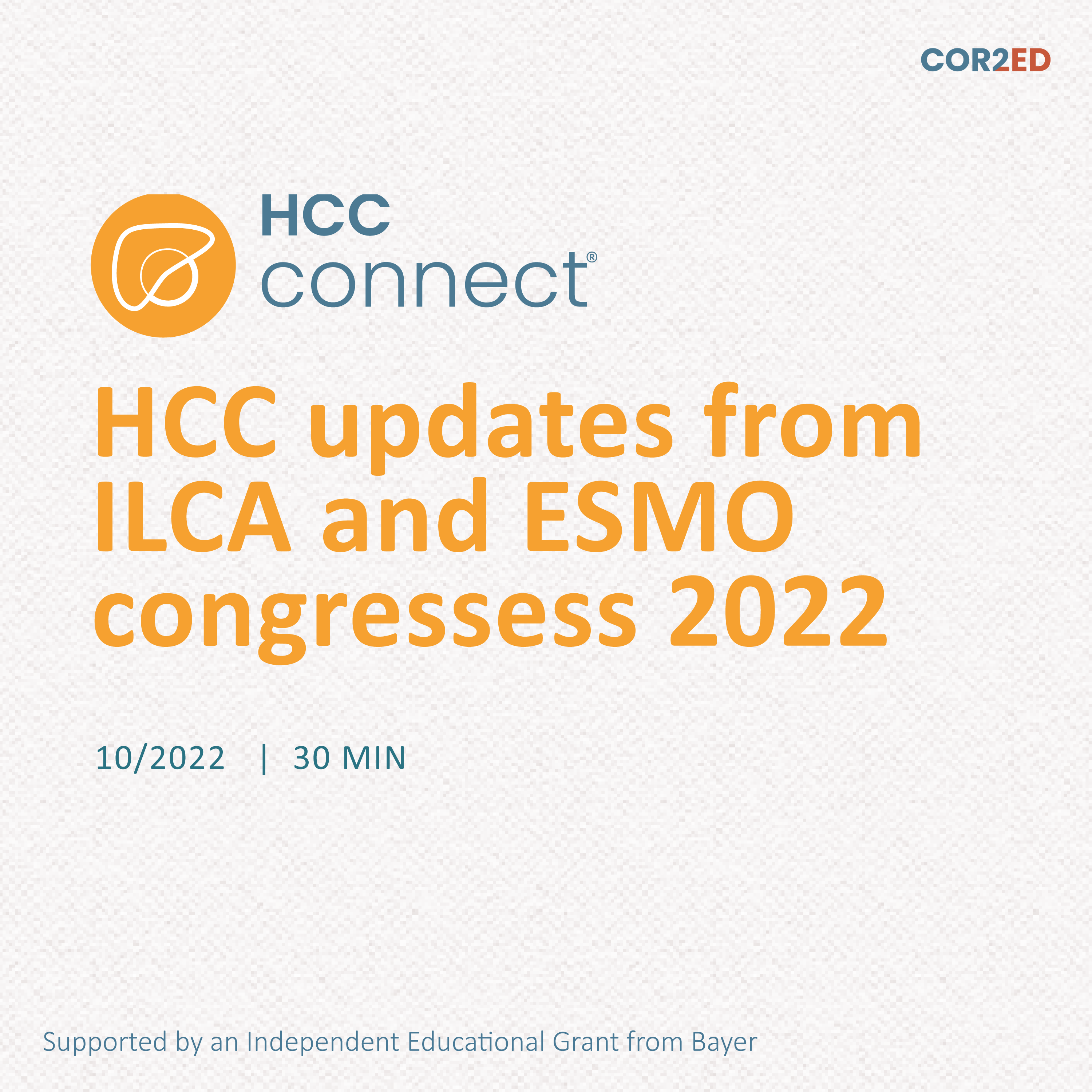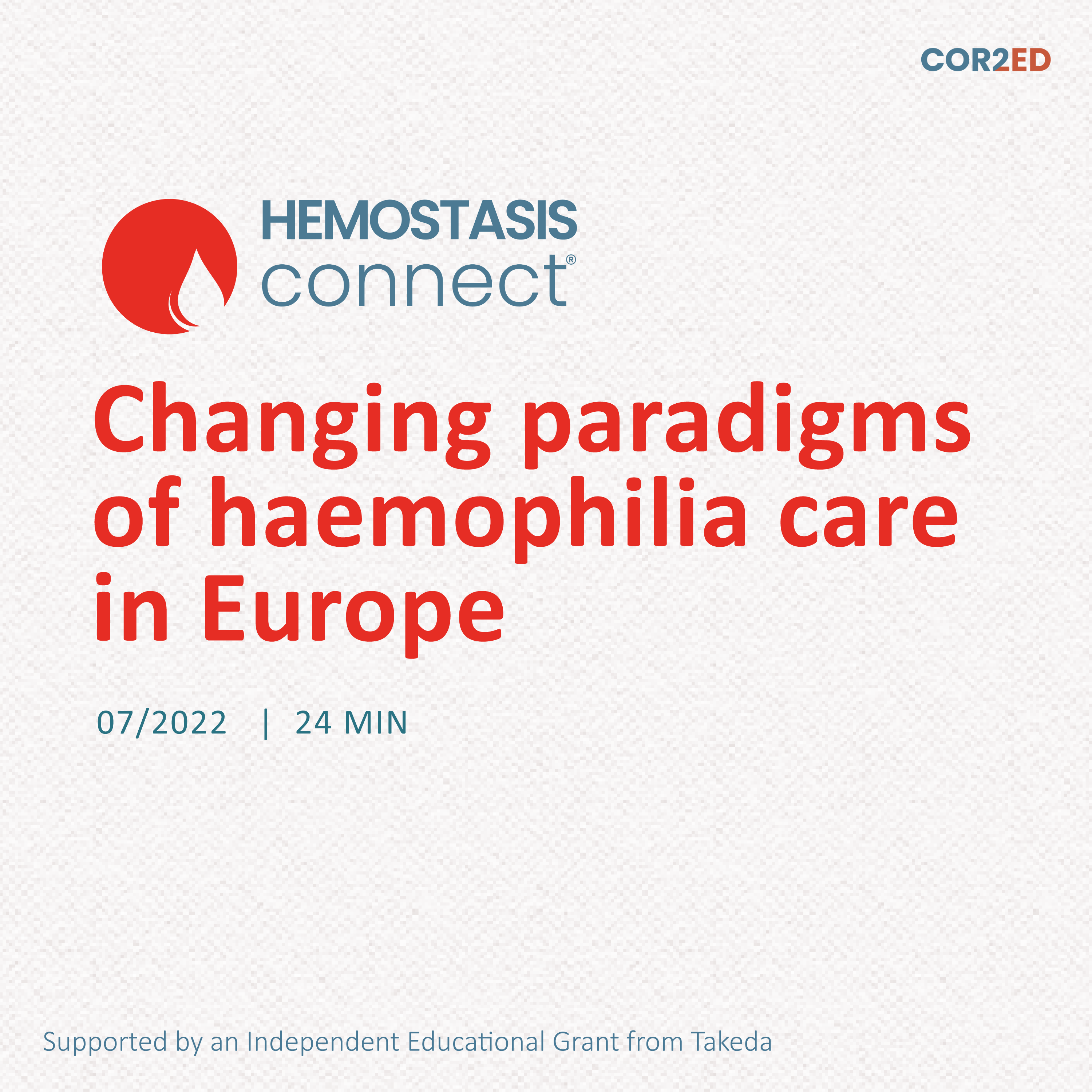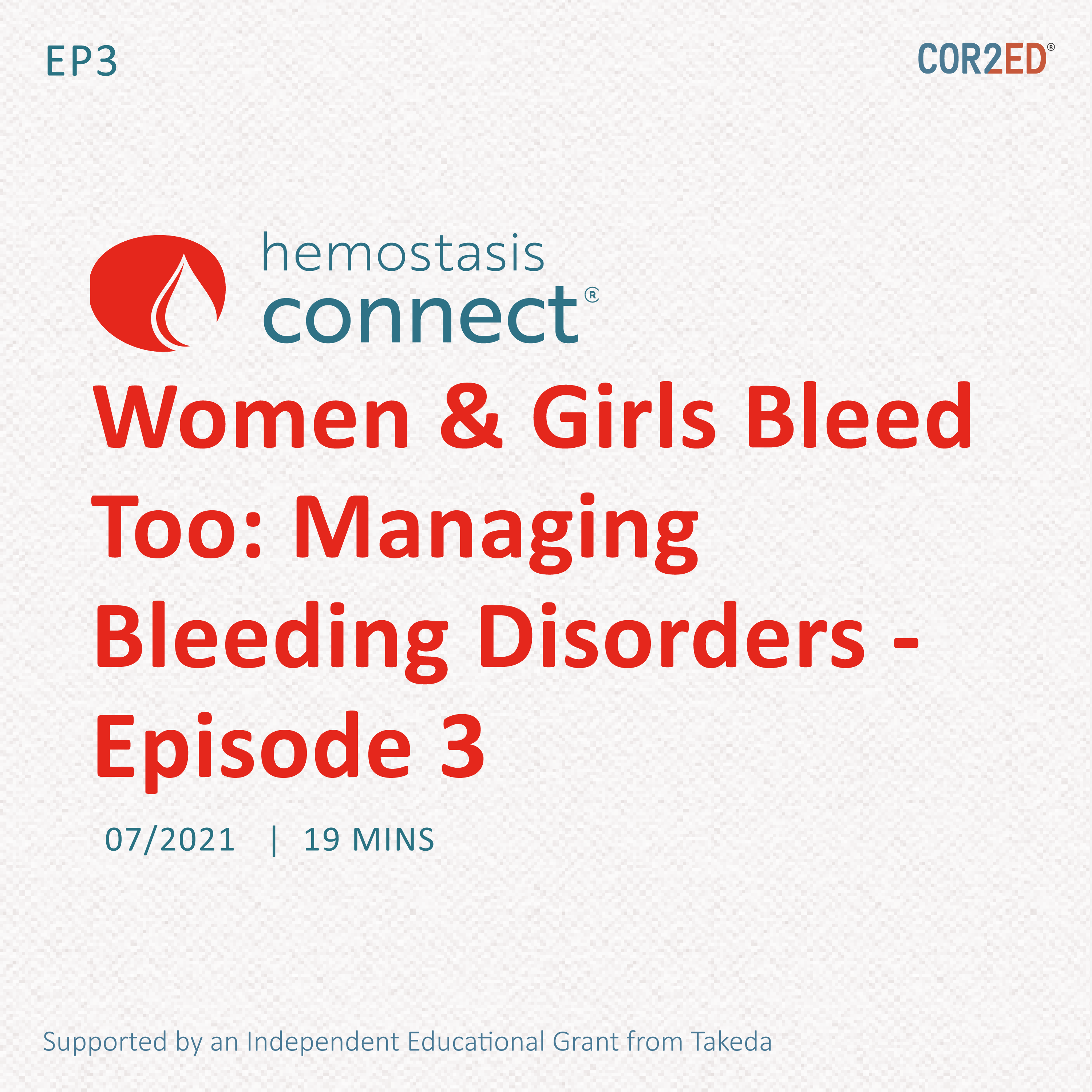Episode Transcript
Monitoring anticoagulation: Yes or No?
Brought to you by:
Prof. Dimitrios Tsakiris, Basel University, Switzerland
Prof. Michael Nagler, Inselspital University Hospital, Bern, Switzerland
Introduced by:
Tonke de Jong, COR2ED
Please note:
HEMOSTASIS CONNECT podcasts are designed to be heard. If you are able, we encourage you to listen to the audio, which includes emotion and emphasis that is not so easily understood from the words on the page. Transcripts are edited for readability. Please check the corresponding audio before quoting in print.
This podcast is an initiative of COR2ED and developed by HEMOSTASIS CONNECT, a group of international experts working in the field of haemostasis. The podcast is supported by an independent educational grant from Viatris.
The views expressed are the personal opinions of the experts. They do not necessarily represent the views of the experts' institution, or the rest of the HEMOSTASIS CONNECT group.
For expert disclosures on any conflict of interest please visit the COR2ED website.
Tonke de Jong (COR2ED)
Welcome and thank you for listening to this podcast from COR2ED Independent Medical Education. This podcast series focuses on thrombosis in various clinical conditions and consists of four episodes. In this first episode, you will hear from internationally renowned experts Professor Dimitrios Tsakiris and Professor Michael Nagler when they discuss the need to monitor anticoagulation in clinical practice. During the podcast, both the technical aspects and the clinical usefulness are debated by the experts.
This podcast is an initiative of COR2ED and developed by HEMOSTASIS CONNECT, a group of international experts working in the field of haematology. The podcast is supported by an Independent Educational Grant from Viatris. The views expressed are the personal opinions of the experts. They do not necessarily represent the views of the experts' organisations or the rest of the HEMOSTASIS CONNECT group. For expert disclosures on any conflict of interest, please visit the COR2ED website.
Prof. Tsakiris
Good morning. My name is Dimitrios Tsakiris and I'm a Haematologist at the University of Basel in Switzerland, specialising in haemostasis. We would like to discuss with you today the issue of monitoring anticoagulants. Within that, this is an important topic because it helps practitioners of medicine to judge intensity of anticoagulation and under certain circumstances, also help them guide treatment of these patients.
But first, let me welcome Professor Michael Nagler in the discussion. He is an expert in laboratory medicine, a Haematologist Epidemiologist. And I would like to let him introduce himself in the discussion. Dr Nagler, please.
Prof. Nagler
Thank you very much Dimitrios. I'm happy to do this with you. So I'm really interested in the topic of anticoagulation in monitoring and one could even say that this issue has significantly influenced the course of my career. So the key question I was always interested in is what does this specific test result or lab test result mean for the individual patient? And I'm very happy to discuss that with you, Dimitrios.
Prof. Tsakiris
Thank you, Michael. We would like to start with some technical aspects because understanding the technical background of the test systems is crucial for the choice of the monitoring way, how to go. Now we know that anticoagulation is available since almost 60 years now, and there have been traditional test systems to follow them, at least the first anticoagulants that were available. But since ten years now we have a variety of new direct anticoagulants which help us treat patients. But they pose technical problems concerning measuring intensity of the action of these drugs.
We will focus on the direct oral anticoagulants first, because they are widely used nowadays, and we know that there are some techniques which vary between themselves available to monitor them. The gold standard, for example, when DOACs were introduced in the treatment was mass spectrometry. This is a very elaborate technique which is not available in the usual laboratories, but along the way simpler test systems were developed which were specific or more universal for detection of these drugs.
So could you introduce us a little bit to these techniques Dr Nagler? How did you experience the appearance of these specific or universal anti-Xa systems, as they are called for monitoring DOACs?
Prof. Nagler
Of course. So I fully agree that mass spectrometry methods have clear advantages that qualify them as the reference standard. Sensitivity and very low concentration, specificity in terms of which drug is used, capture of drug metabolites, linearity, also in low and high concentration. But yes, you already said this, they are not available in clinical practice. Results need to be available quickly and this is simply not possible with mass spectrometry methods. These chromogenic anti Xa assays that capture the inhibition of exogenous factor Xa, which we have known for decades from heparins can be implemented on almost any conglomerate. So it's at least in theory, widely available or can be made widely available.
So these techniques are good and we are experienced in it and when we adapt it accordingly to the target or anticoagulants and implement it in current healthcare processes, I think they can be really of value.
Prof. Tsakiris
You know, in medicine, making things simpler is always very attractive and there have been visions followed. I can think of that Theranos issue where out of one droplet of blood you could check any kind of test analysis that you would like, but that was illusionary at the end.
Now, if we think of that development in the anti-Xa assays that a universal anti-Xa test system could be sufficient to be used for all three available DOACs, that would have a great impact in practice in medicine. Do you have an opinion on that? Because there are some studies, very interesting studies which confirm the usefulness of such a test system.
Prof. Nagler
Absolutely, I fully agree. The problem of these anti-Xa assays are a practical nature, do you normally need one calibration for every drug you would like to measure. And there are quite a number of ideas and tests and studies to apply a universal calibrator to this. And we did a very large study, used different calibrators, tried it out with different calibrators and it works. If you concentrate on categorical critical drug levels and that works very well, but if you would like to measure accurate drug levels, I think it's hard to implement it unless there will be somewhere in the international WHO standard or something. But if you would like to measure specific drug levels in terms of micrograms per litre or something, I think a universal calibration is not possible. But if you go for categorical that is clinically relevant drug levels, I'm convinced it works very well, and this is the question which is important for the physician.
Prof. Tsakiris
Yes, that is correct. But we have the thing here that manufacturers have published actually, at least two of them, only anti-Xa universal values of the activity of the drug. So we have an option to judge how much intensity do we have in circulating blood concerning the drug. And as you said, this should be a categorical evaluation and help the clinicians say, I have enough or not enough or too much of that. Would that help a little bit the implementation of these universal tests?
Prof. Nagler
The questions physicians would like to ask and the decisions they have to make is, shall I give a reversal agent in case of bleeding, or can I operate this patient safely in case of urgent surgery? For example. And for this these are, I mean, clear clinical questions and they can be answered in a categorial way, yes or no. Are the drug levels low enough that I can go straight forward to operation? For example. And so in this way, it's possible, easily possibly with categorial cut off values. You don't need, for answering these questions, you don't need precise information on the drug level.
Prof. Tsakiris
Correct. I mean, at the bedside level, this is correct. Now, you have noticed we have already bridged the way to the second main topic of discussion, the usefulness of monitoring the anticoagulants. And this is important to discuss because traditionally anticoagulants, these are the first ones have been very closely followed and monitored. But since the appearance of the newer direct anticoagulants, we don't need that at least the manufacturers planned and organised studies which showed that close monitoring is redundant. But despite that, I know that in laboratory medicine two philosophies exist, one says we don't find anything if we don't look for it and the other says a non-investigated patient is a healthy patient. So you have to choose what to follow. Personally, I prefer the first option to measure everything that we can measure because that helps us understand the background of any medical problem.
But concerning these statements of the manufacturers that we don't need monitoring of the DOACs, how do you experience it in everyday life? I mean, if you have very well-established anticoagulation in a patient, you don't need to know how intense it is, it works. But what do we do in case of emergencies, emergency operations or bleeding? But how do you experience that in your everyday work?
Prof. Nagler
So I believe we have to distinguish two distinct situations. First, monitoring in the narrow sense and the detection of critical drug levels in the context of acute bleeding, upcoming surgery and thrombolysis. In the second case, there are many experts who see a benefit of measuring drug levels, I mean, for decisions of whether I shall give a reversal agent, whether I can proceed to surgery, whether I can proceed to thrombolysis. In the case of monitoring, in terms of determination of peak or trough level concentrations and adjustment of the drug dosage, I mean, there are no studies to demonstrate efficacy and safety of this type of management. I have to know what to do when I would find a lower than average drug level in some patients. Shall I increase the dosage? Or if I find higher drug levels shall I lower the dosage? There are simply no studies which study this kind of management. And also, I mean, the dosage of the drugs of the tablets is more or less fixed. So this is an important aspect of monitoring or an important piece of evidence that we need before monitoring. We must know what to do. And this management must be confirmed in a study and is simply not available. I think it's a strong argument against monitoring in routine clinical practice, but of course we're measuring drug levels in special situations in many diseases in many patients, and it's important to know the drug levels before surgery. And so I think many experts agree on this, also extrapolated from other diseases and other situations.
So I think we have to distinguish two situations, and I believe it's useful in a number of special situations. But monitoring in terms of adjusting the drug levels in routine clinical practice, we simply do not have the data.
Prof. Tsakiris
That is correct. The variability of kinetics of these drugs do not need to be checked and adapted according to their intensity or concentration because they work. Otherwise that was what the studies told us. The license studies of all of them.
Prof. Nagler
In the last ten years or so, quite a number of observational studies appeared in special patient groups, very obese patients, patients with renal, at least moderate renal insufficiency, old patients and so on. And the essential results, or the interpretation is it works in every patient group. So we do not see a particular patient group where the effectiveness, efficacy and safety differs dramatically from overall. This is also, I think, a strong argument against a routine monitoring approach.
Prof. Tsakiris
That is correct, but do you think that we still need them in special cases, such as you mentioned, stroke and the fibrinolysis treatment? Do we have circulating drug or not? That would be a no go or indication to give direct antidote. Do we have circulating drug or not? Measuring that under these circumstances is possible because automisation allows us to have a result in a short term. You don't have to wait hours for that. But just minutes today. So if I would like to close that first part of the discussion before we go to the next topic, I would say that a key method would be in this situation, choose wisely whether you would like to measure drug intensity but keep in mind that you don't find anything if you don't look for it. So in special situations it is useful and can be usable quasi the result of the testing of anticoagulation.
Now just a few words to change the subject a little bit and go back in time to the older anticoagulants. It is undisputable that vitamin K antagonists need monitoring as it has been done until now with INR following, and heparins also need monitoring, especially unfractionated heparin. There is a trend lately to follow unfractionated heparin with more modern anti-Xa tests and many big hospitals in Switzerland have already implemented that. Do you have an opinion on this? Should we leave traditional global tests such as aPTT back in to take the newer anti-Xa tests for unfractionated heparin?
Prof. Nagler
Yeah. Also the efficacy of unfractionated heparin, but also vitamin K antagonists depends on so many patient factors and we have been used to monitoring for decades. With regard to unfractionated heparin, guidelines still recommend the aPTT for monitoring, but mostly for theoretical reasons and they consider it as a functional test. But everyone in clinical practice knows the problems of influencing. Many influencing factors and the clinical data and I reviewed them recently, the clinical data supporting this evidence were collected decades ago and these are simply poor. So I'm convinced that the observational data we have for anti-Xa measurements are much better than aPTT.
So there are observational studies, very old observational studies supporting aPTT. But I'm convinced that the data we accumulated with regard to anti-Xa to date are better than for the aPTT and I think it's still recommended for theoretical reasons. And the arguments are, in terms of clinical data, are not good. And every institution I know which implemented an anti-Xa approach is very happy with it.
Prof. Tsakiris
I would agree with that, anti-Xa systems can be more standardised in that way, which was not the case with the classical global anticoagulation assays before that.
So I think we have come to the end of this discussion. Please allow me to summarise very briefly and give you three key messages as we have discussed them, focusing on DOAC. DOAC monitoring is useful whenever we need it and whenever we need to know the activity of circulating drug in special situations, but not as a routine monitoring. DOAC choice and dosing should still be guided by individual clinical characteristics that we should keep in mind and not let us guide by the monitoring results. And the last - labs can still efficiently use their traditional test systems to monitor anticoagulants. But in the name of the better intra laboratory comparability, anti-Xa assays should be preferred over others.
Dr Nagler, before we close do you have an additional point to give us?
Prof. Nagler
Thank you very much. There's an additional point. I have a strong opinion, and that is the monitoring of vitamin K antagonists, because there are still patients treated with vitamin K antagonists and the monitoring of these patients is rather difficult and you need a lot of training and practice to do this and doctors are not used to it anymore. So if you have patients like this, I strongly recommend to send these patients to designated training programmes or monitoring programmes, for example, patient monitoring or other anticoagulation clinics, because this is a difficult treatment and needs a lot of practice.
Thank you very much for inviting me Dimitrios. It was a pleasure.
Prof. Tsakiris
Thank you Michael for that. Thank you listeners for being with us today. We hope that you will enjoy this topic. See you and hear you next time. Thank you.
Tonke de Jong
We hope you enjoyed the first podcast episode in this series on thrombosis in various clinical conditions. If you like this episode, look out for more episodes in this series on the COR2ED medical education channel. There are three other episodes in this series where Professor Tsakiris leads the expert discussion on thrombosis and cancer, venous thromboembolism and thromboprophylaxis.
Also, don't forget to rate this episode on the COR2ED website and share our podcast on social media or with your colleagues. Thank you for listening and see you next time.


